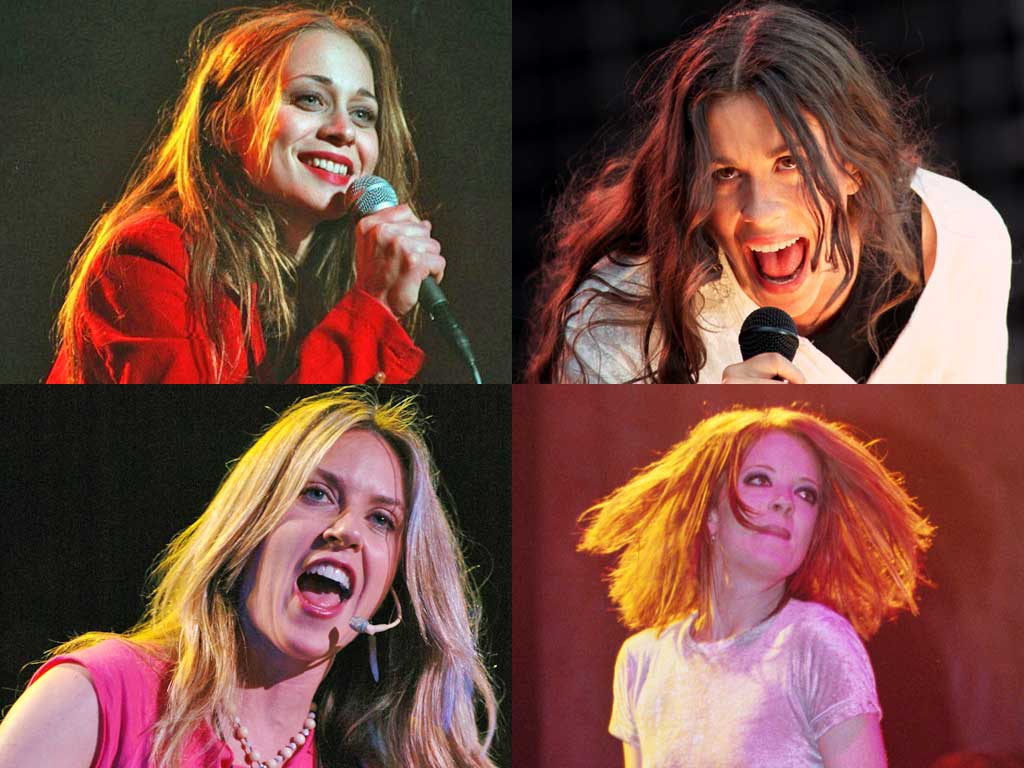Trending: They don't make rock chicks like they did in the '90s
Many of today's female singers simper about boys and clothes, says Gillian Orr. Thank goodness the original rebel-rousers are back

Your support helps us to tell the story
From reproductive rights to climate change to Big Tech, The Independent is on the ground when the story is developing. Whether it's investigating the financials of Elon Musk's pro-Trump PAC or producing our latest documentary, 'The A Word', which shines a light on the American women fighting for reproductive rights, we know how important it is to parse out the facts from the messaging.
At such a critical moment in US history, we need reporters on the ground. Your donation allows us to keep sending journalists to speak to both sides of the story.
The Independent is trusted by Americans across the entire political spectrum. And unlike many other quality news outlets, we choose not to lock Americans out of our reporting and analysis with paywalls. We believe quality journalism should be available to everyone, paid for by those who can afford it.
Your support makes all the difference.Last week we learned that Canadian singer-songwriter Alanis Morissette plans to release a new album, Havoc and Bright Lights, this August. If that doesn't leave you nostalgic for the Nineties, in which Morissette's Jagged Little Pill was the second biggest-selling album of the decade, then the news that both Fiona Apple and Garbage also have new records out soon should.
Along with artists such as Liz Phair, Tori Amos and Hole's Courtney Love among others, Morissette, Apple and Garbage's Shirley Manson all rose to prominence in the Nineties and represented a new wave of women in music who were outspoken, unhinged, aggressive and extremely sexual. After riot grrrl, the underground punk movement, had exploded at the beginning of the decade, it wasn't long before the mainstream music world welcomed a number of opinionated female rock acts. These were the heroines of Generation X, rejecting their mothers' brand of feminism and deconstructing femininity.
Morissette burst onto the scene in 1995 with Jagged Little Pill, an album so full of rage with lines such as "It was a slap in the face how quickly I was replaced/ Do you still think of me when you f**k her?", that Rolling Stone put her on their cover with the caption "Angry White Female".
Apple's best-known song Criminal from her 1996 debut album, Tidal, opened with the line, "I've been a bad, bad girl", while Manson defecated on her boyfriend's cornflakes and discussed the pleasures of oral sex in interviews. It makes you wonder where all the bad girls in music are today. "Those women were amazing; they were such fighters," says Hanna Hanra, editor of The Beat magazine. "Who would you compare them to now? I guess M.I.A is one. Cat Power perhaps. But it's not really a thing."
While there might be a dearth of angry women around, many of the female stars today still owe something or another to the artists of the Nineties. In a piece for the Wall Street Journal earlier this year, Liz Phair, whose acclaimed 1993 record, Exile in Guyville, shocked with one of the frankest portrayals of female sexual desire ever put to record, wrote: "Lana Del Rey is exactly what I was hoping to inspire when I took on the male rock establishment almost 20 years ago with my debut record."
Whether or not Del Rey, who has already scored a number one this year, is a worthy carrier of the torch is not really the point here; the point is that Phair is right: she and her peers did open doors for female artists today, even if today's stars are more likely to cry over men or titillate them than want to destroy them. If artists such as Del Rey, Katy Perry and Rihanna were to write so honestly about what it is to be a woman, it would damage their carefully cultivated sexed-up aesthetic. Are modern acts afraid that the public can no longer handle a woman who is happy to admit she can be a pain in the arse; promiscuous; a bitch?
Not all the artists that found fame in the Nineties have sustained their influence. While Garbage seem to be back on fine form and Fiona Apple's recent spate of live shows were called "breathtaking", Morissette's more recent offerings were poorly received, and branded self-indulgent by a public that seems to have lost interest. But just hearing that all three are releasing records is enough to inspire a bit of reminiscing about the Nineties and a longing for the sort of wild, complex and tough women the music scene produced.
Standing on stage at the Montreal Jazz Festival a few years ago, Manson introduced a song with a call to arms: "Where are all the girls who want to be like Patti Smith?" she cried. "What is wrong with the world when everyone wants to be like Jessica Simpson? Now, no disrespect to Jessica Simpson because there is, of course, a place for that. But where, oh where, are all the girls who are going to challenge that whole notion of what it is to be a female in this world today?" It's good to have you back; you've been missed.
Join our commenting forum
Join thought-provoking conversations, follow other Independent readers and see their replies
Comments